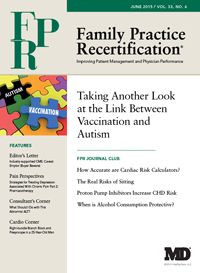Publication
Article
Family Practice Recertification
Taking Another Look at the Link Between Vaccination and Autism
Author(s):
This Meta analysis verified that there is no relationship between MMR vaccinations and the development of autism, and found no evidence of publication bias, implying that the medical literature was not altered to hide an association.
Review
"Responding to Jenny McCarthy: Vaccines are Not Associated with Autism.” Vaccine 32 (2014): 3623-3629.
Summary
This Meta analysis verified that there is no relationship between MMR vaccinations and the development of autism, and found no evidence of publication bias, implying that the medical literature was not altered to hide an association.
Methods
This was a meta analysis that resulted in identifying 5 cohort studies covering over 1.2 million children and 5 case control studies involving almost 10,000 children.
Study Results
The cohort data found no relationship between any vaccination and autism (OR: 0.99; CI: 0.92-1.06) or autism spectrum disorder (OR: 0.91; CI: 0.68-1.20). There was no relationship between autism and the MMR vaccination (OR: 0.84; CI: 0.70-1.01), or thimerosal (OR: 1.00; CI: 0.77-1.31), or mercury (OR: 1.00; CI: 0.93-1.07).
For the case control data there again was no evidence for increased risk of developing autism or autism spectrum disorder (ASD) following MMR, mercury, or thimerosal exposure when grouped by condition or grouped by exposure.
This study also evaluated the data for publication bias and found none, implying that no data was hidden by manufacturers or other vested interests in order to deceive the public. Publication bias occurs when research was conducted but not published. This happens for a number of reasons, including where outcomes were not improved or adverse outcomes occurred and the researcher chose not to submit for publication.
Conclusion
This meta-analysis suggests that vaccinations are not associated with the development of autism or ASD. Additionally, the components of the vaccine (thimerosal and mercury) or multiple vaccines are not associated with the development of autism or ASD.
Discussion
This is the first meta-analysis to determine that vaccination, and in particular vaccination with MMR, does not increase the risk of autism or ASD. Previous studies had evaluated the efficacy of MMR vaccination on preventing illness, with adverse events section tracking unintended outcomes, including ASD (Cochrane Systematic Review 2012; 2:cd004407).
Older data has long demonstrated by observation that while the rate of MMR immunization around the world has remained relatively stable, the incidence of autism and ASD has exploded over the last 25 years. Additionally, the incidences of morbidity and mortality from measles, mumps, and rubella have dropped significantly in correlation with the increase in MMR use. Thus, the overall benefit on society from the vaccine seems obvious and highly pertinent.
The strength of this study is the follow-up of the cohort studies at over 8 years. Autism and ASD are normally identified within the first 2 years of life. Thus, the risk of missing a diagnosis is unlikely. Weaknesses of this study include the vaccine adverse effects database data was not included as these are single case reports. Their numbers were too small to overcome the vast population of patients who received the vaccine and did not develop these conditions.
One further strength of this study is one of the author’s children developed febrile seizures after vaccination that may have made him bias towards looking for a possible adverse correlation with vaccine. He was happy to report that none were found despite his less than objective perspective.
Regarding publication bias, this study underwent a variety of tests (Egger’s regression analysis and Begg and Mazumdar rank correlation) and found no presence of publication bias. This should reassure all rational parties there was little chance data were not published to hide the risk of an adverse outcome. The authors further noted that due to the thoroughness of their literature search, the controversial nature of this issue, and the large volume of data on vaccination and ASD, “it is unlikely that so many papers on one side of an argument that met inclusion criteria would remain unpublished.”
This study tells up two important things. First, neither MMR vaccination nor its components lead to autism or ASD. The second is the lack of publication bias found on this meta analysis. One can competently say the medical literature has not been altered to potentially “hide” data that supports a possible severe adverse outcome associated with the MMR vaccine. When patients present this rationale for refusing to vaccinate their children, you can quote this article as substantial proof that this sort of bias is not present.




